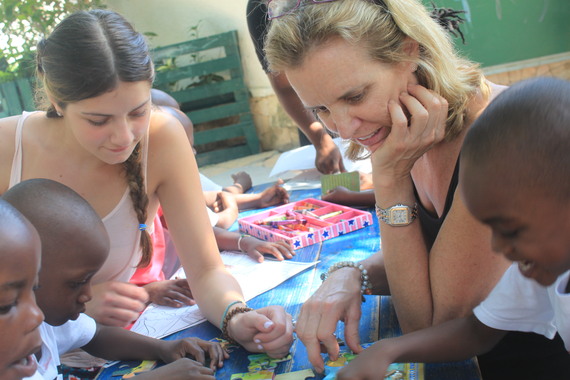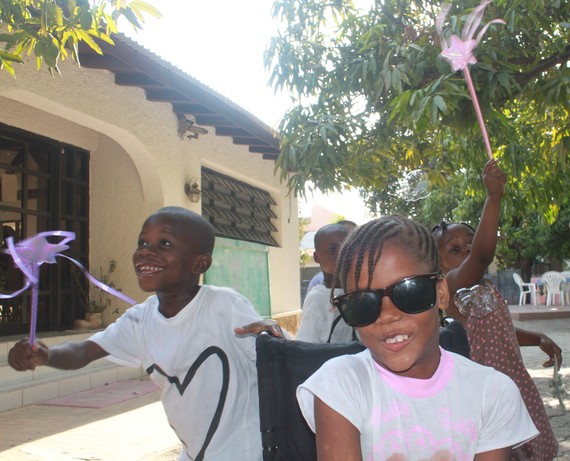Dear Cara and Mariah,
Happy Easter!!
It's been pretty hectic the last few weeks, and I'm very happy that Easter is here, with daffodils and forsythia in bloom, lilacs on the way, and chocolate finally allowed after 40 days of abstinence (though I had enough truffles this morning to make up for all of Lent).
Along with your cousin Kyra, and RFK Center Leadership Council members, staff, and friends, Michaela and I were supposed to build a school in Mexico, but with all the violence there it seemed imprudent, so we headed instead to Haiti (the Mexican school is being built by more experienced hands and will be completed in a few weeks.) As it turned out, I can't think of a more appropriate place to spend Holy Week, as the resurrection was on display everywhere we went.
I first went to Haiti in 1979. I've gone back every few years since. My most recent visit was three and a half years ago, on the six-month anniversary of the earthquake. Port au Prince was a sea of tents, rubble and frenzied activity. I remember thinking that none of these people have jobs, yet everywhere I went people were shoveling, building, hauling, selling, or walking somewhere with determination. When I asked Nancy Dornsinville how people who had lost everyone they loved and everything they had did not give in to despair, she said there was so much death and destruction, those who were spared believed God must have had a special purpose for their survival.
Port au Prince is the physical manifestation of that divine purpose. The city is bustling. The haunting remains of the Presidential Palace have given way to open green space, the rubble that engulfed the city is gone from the major byways, and though a housing shortage persists and too many remain in tents four years later, the capital appears to be lively, amazingly green, full of commotion, in short, a rebirth.
We went to Haiti to work at Zanmi Beni, a home for children in need run by RFK Human Rights Award Laureate Loune Viaud as part of Partners in Health. Some people think ZB is an orphanage, because the parents of the 64 kids there will never be coming to fetch them. But the kids are not up for adoption. This is actually their home, they introduce themselves with the last name Beni (Bonjour, je m'apelle Peterson Beni, je m'apelle Samuel Beni, je m'apelle Marcus Beni, etc.) They care for, and fight with and for one another; when they come home after school, and eventually after college or for Christmas or weddings, this is where they will come.
I asked Loune how it started. On January 12, 2010, Loune attended a meeting of people involved in Haiti's public health system, to devise a five-year plan to help her country recover from four hurricanes -- Fay, Gustav, Hannah, and Ike -- that had wiped away much of the infrastructure upon which the country depended. The impact of the storms on the countryside was overwhelming. Ninety-eight percent of Haiti's tree cover had been deforested, setting the stage for widespread floods that displaced 8 percent of its population and leveled 70 percent of its crops. At the time, it was the costliest natural disaster in Haiti's history, a crushing financial blow for the poorest nation in the Western hemisphere.
Seated at the head of the conference table, the prime minister addressed the group when, without warning, the earth cracked open and swallowed whole the entire wall behind him. When the rumbling stopped, Loune and her best friend, Nancy Dorsinville, crawled out from beneath the conference table and ran into the street to confront the Armageddon around them. Six months earlier, President Clinton had been named U. N. special envoy to Haiti. He, in turn, hired Nancy, a native of Haiti who graduated from Barnard College and held an MA from Harvard School of Public Health, a world renowned leader in women's health who teaches at Harvard, to run the U.N. program. As co-leader of Partners in Health, the group Paul Farmer created which helps the government of Haiti runs its national health system, Loune's first instinct was to head to the General Hospital, the largest hospital in all of Haiti.
When Loune and Nancy arrived, the hospital grounds were littered with bodies, many dead, others writhing in agony. Amid the chaos they found 38 kids, newborns to teenagers, abandoned at the Central Hospital upon birth or when resources disintegrated, all physically and mentally challenged, emaciated, and near death, mostly four to a crib.
"The hospital's director asked me to take the children and I said 'Yes.'" Loune didn't ask how she could do it or where they would live or who would pay for it all. When I asked her how she thought she could do it, she just looked to Heaven and said, "I thought 'He will find a way.'"
That is faith in action.
Since then, Loune has added 26 more to her brood. The latest is Micah, dropped at the Hospital on Easter Sunday a few years ago, blind, starved, and on death's door. Today she is thriving -- impish, fun, and lively, Micah recites the entirety of the 23rd psalm at daily chapel -- a gift of resurrection.
Loune's is an active household, on a small farm on the outskirts of Port au Prince. We ate breakfast with the kids each morning at 5 a.m. (sometimes I admit to being late), then read books, did calisthenics, went to the prayer service at the chapel, played wheelchair keep-away, danced, solved puzzles, ate lunch, played soccer, watched a Bible film, drew pictures, jumped in the blow-up pools, took a walk past the income-generating tilapia farm, hen house, and restaurant, ate dinner, played Uno or checkers with the teenagers, and finally collapsed into bed.
One day Matt Linder came to show Loune our Health eVillages app, which brings up to date medical information to clinicians in developing countries. Actress, comedienne, and RFK Leadership Council member Diane Neal used the app to remove stitches from my hand, declaring on camera, "If I can do it, a nurse can do it." I may be scarred for life...
Our days were pretty hectic. But the kids were delightful, funny, and a total inspiration.
Every member of TiJoe's family perished in the rubble of his home during the earthquake. He spent four days beneath the wreckage, crying for help. When he arrived at Loune's door, he didn't speak. Then, for days, he only repeated "I'm dead. I'm dead. I'm dead." Today, TiJoe is 11. He loves soccer and is a fierce competitor. Michaela spent hours showing him games on her laptop and practicing English with him -- his third language after Creole and French.
When the Bureau of Social Services discovered that a contingent of U.N. soldiers, deployed to Haiti to keep the peace, had kidnapped Roudy and were raping him nightly as a sex slave, they brought the boy to Loune. At 15, Roudy's shaved head makes his egg-shaped skull distinct atop his fireplug build. He is always at the side of sweet and pretty Nephtalie, whose wheelchair he glides across the stone yard and up and down the steps. He has an easy smile and is quietly helpful, distributing books when it's time to read and sitting with Patrick, deaf and mute, at every meal.
At eight years old, Wendy, olive skinned with piercing green eyes, watched his father take a stick and beat his mother to death. A few years later, his best friend died of gunshot wounds. Orphaned, despondent, homeless, lost, and defiant, he came to Loune's door. Wendy Beni is now 18, in 9th grade, goes to school every day, helps his brothers and sisters eat meals and play sports, and is determined to finish high school and become a master carpenter.
Carl is four. With two club feet, he cannot walk, but that does not slow him down. While other kids saunter, he glides across the ground on his hands, dragging his legs. With massive upper body strength he climbs onto the benches, and nothing makes him happier than twirling around on one of several tire swings. He will not be denied on the soccer field, and whacks the ball with his entire lower body, sending the orb spinning towards the goal. Next month, he will travel to Toronto, where volunteer doctors will perform a series of operations they believe will allow him to walk for the first time.
Every day at Zanmi Beni we went to the chapel. The kids sang and I prayed beneath the images of the Haitian Jesus and the Haitian Mary, no blond hair and blue eyes here, but reflections instead of the saintly people around me. Children, women and a scattering of men, who have endured unspeakable violence and anguish, loss and horror, agony -- biblical in force and nature -- and have responded with unbounded love.
Redemption. Resurrection. Faith.
I leave Haiti with these gifts in abundance.
All holy days, no matter the religion with which they are associated, contain lessons for all humanity. Easter is rebirth. Haiti, and specifically Zanmi Beni, is the embodiment of that. The lessons of resurrection transcend chocolate bunnies or labels of denomination.
When asked how she endured so much loss, Great Grandma Rose used to say, "After the storm, the birds sing. Why shouldn't we?"
The birds are singing in Zanmi Beni.
With Easter love,
Momma
Wendy Abrams, Jayni Chase, Gail Evertz, Annabel Lee Hogg, Dick Iannuzzi, Matt Linder, and Diane Neal joined Kyra Kennedy, Michaela Kennedy Cuomo, and me on the delegation.


